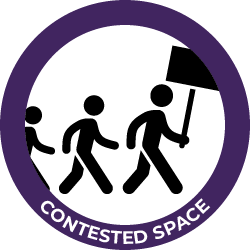Place
Carlton's Rock Pile
"That was a very bad experience, because about four or five of us walked in, and Buddy Teagert was the leader, and he said 'sit on the floor..." And then the owner came over and said 'There’s dirt on the floor, I’m going to mop it'” and then he started to pour ammonia on people, hold their nose. So I ran away and called the police. What happened was, you know, you couldn’t breathe; it was like you were drowning. Just as I caught my breath he started coming back around, and all I could think of was that this was a gas chamber."
- Rosemary Ezra
Carlton's Rock Pile was a segregated convenience store at 1501 E. Franklin Street in Chapel Hill that served only white customers. It was the site of civil rights protests, including one on December 1, 1963 in which the owner, Carlton Mies, doused protestors with ammonia.







